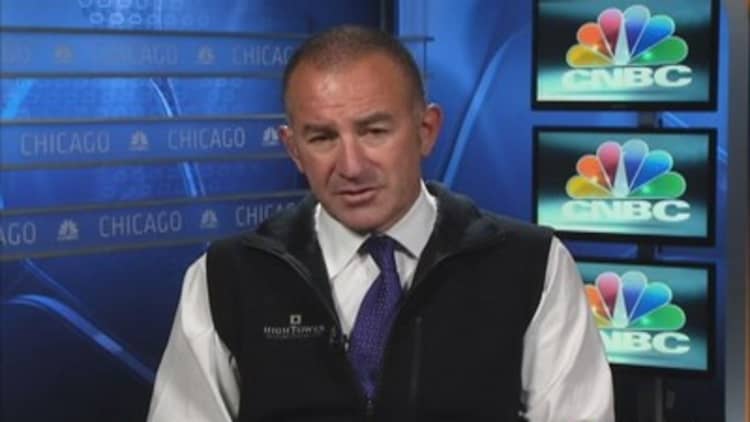So you've finished school, and you have your first real job and a steady paycheck. What now?
First things first: Accept that your income likely won't stretch as far as you want it to.
"The biggest problem I see with young adults is them not living within their means," said Ben Tobias, a certified financial planner and president of Tobias Financial Advisors.
"Before you do anything else, look at the income you have available and do not spend more than that," he said.
According to the National Center for Education Statistics, the 2012 median earnings for young adults ages 25 through 34 who worked full-time and held a bachelor's degree was $46,900. For those with a high school diploma, the median income stood at $30,000; for those with no diploma, $22,900.
Regardless of where your new income stands, it's easy to fall prey to the lure of luxuries you've been dreaming about someday buying.
Read MoreMillennials don't like stocks
"When you're in your 40s or older, you'll drive the nice car and go to the finest restaurants, but not now," Tobias said. "Don't worry about showing off."
Before making choices about exactly how to divvy up your income, advisors recommend tracking your expenditures for several months to get an accurate handle on exactly where your money goes. At the same time, learn about how money works.
Leverage data, technology
"I recommend spending one hour a week focusing on finances—reading about it, updating your budget, doing things like that," said Brittney Castro, a certified financial planner and founder of Financially Wise Women. "You don't have to learn about everything under the sun, but enough to be [helpful]."
Certified financial planner Andrea Blackwelder suggests taking advantage of being part of an Internet-savvy generation.
Read More5 ways advisors can snag Gen Y clients
"Use your technology smarts as a tool to understand your finances on a personal level," said Blackwelder, owner of Wisdom Wealth Strategies.
She and other advisors steer clients to Mint.com, a free web-based personal financial management service.You can link your bank accounts to it, track your expenses and figure out how to adjust your expenditures as necessary. And you'll see in graphic color how much of your income is being eaten by debt.

For those coming out of college, it's not uncommon to be saddled with student loan debt. Six months after you graduate, you are expected to start paying it back.
Americans owe an estimated $1 trillion-plus in student loans, according to the Consumer Financial Protection Bureau. The average amount owed per graduating student in 2012 was roughly $29,000.
Read MoreSend kids to financial summer camp
If you owe a lot of debt and your loans are underwritten by different institutions, you might be able to consolidate them into a lower-costing loan.
While writing that check every month might be painful, doing so actually helps with another important aspect of being financial fit: establishing a credit history.
If you don't have student loans to pay, you can start establishing credit by getting a credit card with a low limit. The key with that, though, is restraint. That means making small charges and paying the balance in full every month.
"Never have a balance carry over on a credit card," Tobias said. "That's the kiss of death, because it creates unrealistic expectations about what you can afford to spend."
Read MoreFinancially savvy kids learn early on
Also, in some states, employers are allowed to check a job applicant's credit history as part of their consideration for employment.
Meanwhile, some financial advisors say it's important to make detailed budgets; others say not so much.
"If you have the kind of personality that lets you write out a budget, break it down into categories and stick to it, wonderful," Tobias said. "But the truth is, most people aren't like that."
Of course, retirement is a financial goal. But you have other important goals, too, like buying a house or having kids.Ben Tobiaspresident of Tobias Financial Advisor
He emphasized that the whole point is to make sure you don't spend more than you have, regardless of how you're spending it.
Additionally, it's important to save for retirement if you can afford to. But advisors say not to sock away more than you really should be, relative to your income, expenses and more immediate goals.
Read MoreTeaching kids money ABC's
"Of course, retirement is a financial goal," Tobias said. "But you have other important goals, too, like buying a house or having kids."
Tobias added that some young people put the maximum in their 401(k) plan but are simultaneously running up credit card debt.
"That makes no sense," he said.
If you can put money in your 401(k), advisors agree the ideal is to at least contribute the percentage you need to capture a matching employer contribution.
Read MoreParents bank on special needs trusts
"It's free money," said Blackwelder at Wisdom Wealth Strategies. "If you don't get that match, you're leaving money on the table."
As for young adults who think they are going to save more money by living with Mom and Dad for a few extra years, advisors caution that the longer grown children stay at home, the harder it is for them to become fully independent, financially and otherwise.
Pulling your weight
Certified financial planner Avani Ramnani with Francis Financial said that if you are living with parents, "don't have your parents doing your laundry for you or things like that."
She said the children also should be contributing financially.
Read MoreIRS ups 401(k) limits
"They might buy groceries or pay rent or something similar," Ramnani said. "The point is to learn how to be a financially responsible adult."
A 2012 survey conducted by the National Foundation for Credit Counseling found that 56 percent of adults do not have a budget for managing their money, and 42 percent said they gave themselves a grade of C,D or F on personal finance.
Additionally, 80 percent said they could benefit from additional advice and answers to everyday financial questions from a professional.
If your parents work with a financial planner, check to see if the planner will meet with you at no cost. Many planners offer that service to their clients' children.
Read MoreSandwich generation in a pickle
Blackwelder said local Financial Planning Association chapters often donate their time at events to offer free financial-planning advice.
"There is more free financial advice out there than there's ever been," Blackwelder said. "I encourage people to find free programs and take advantage of them."
—By Sarah O'Brien, special to CNBC.com





